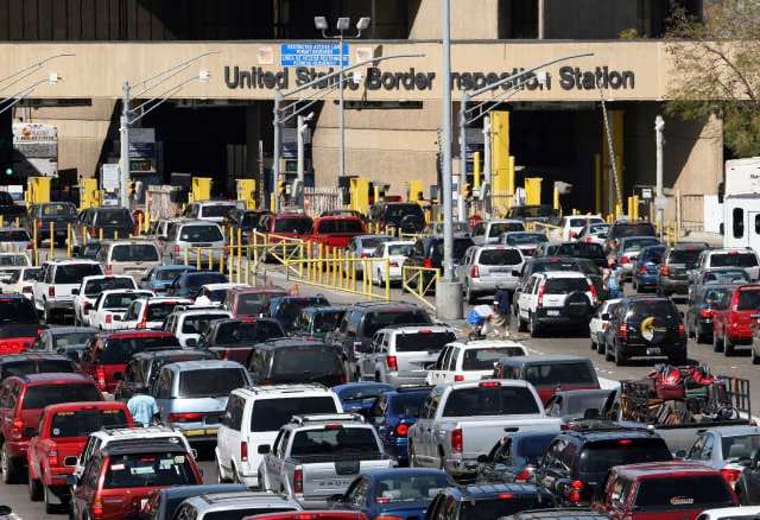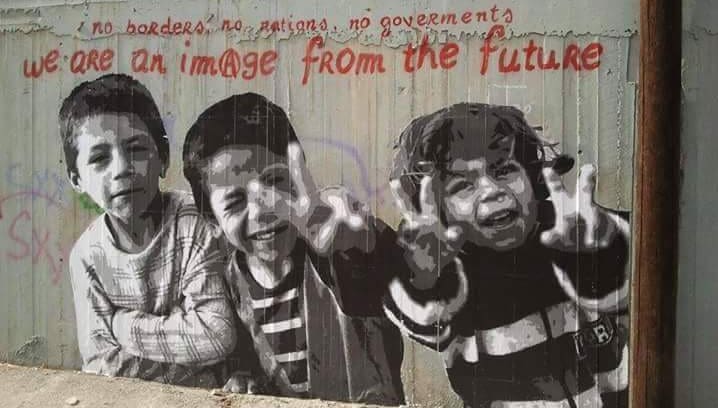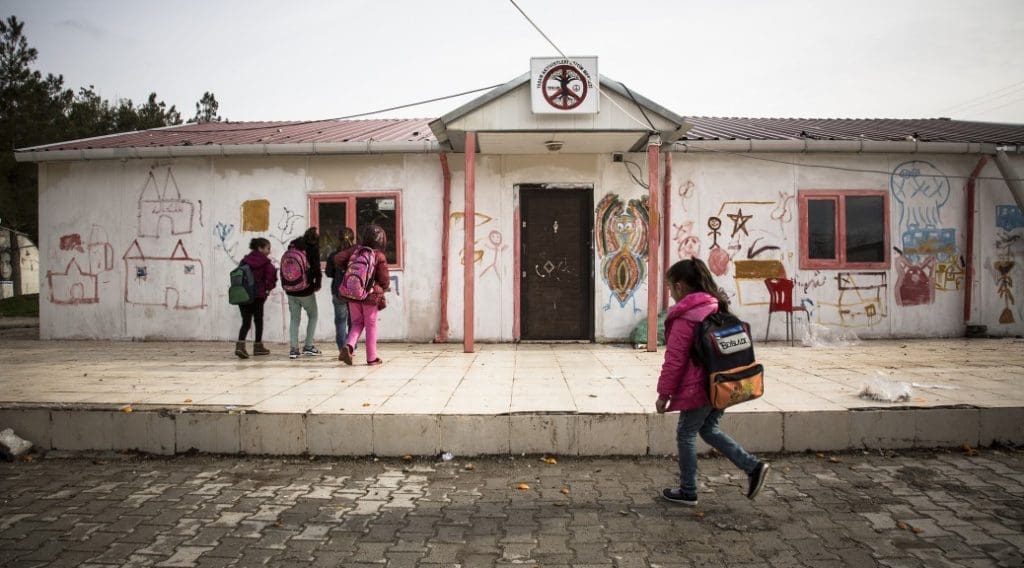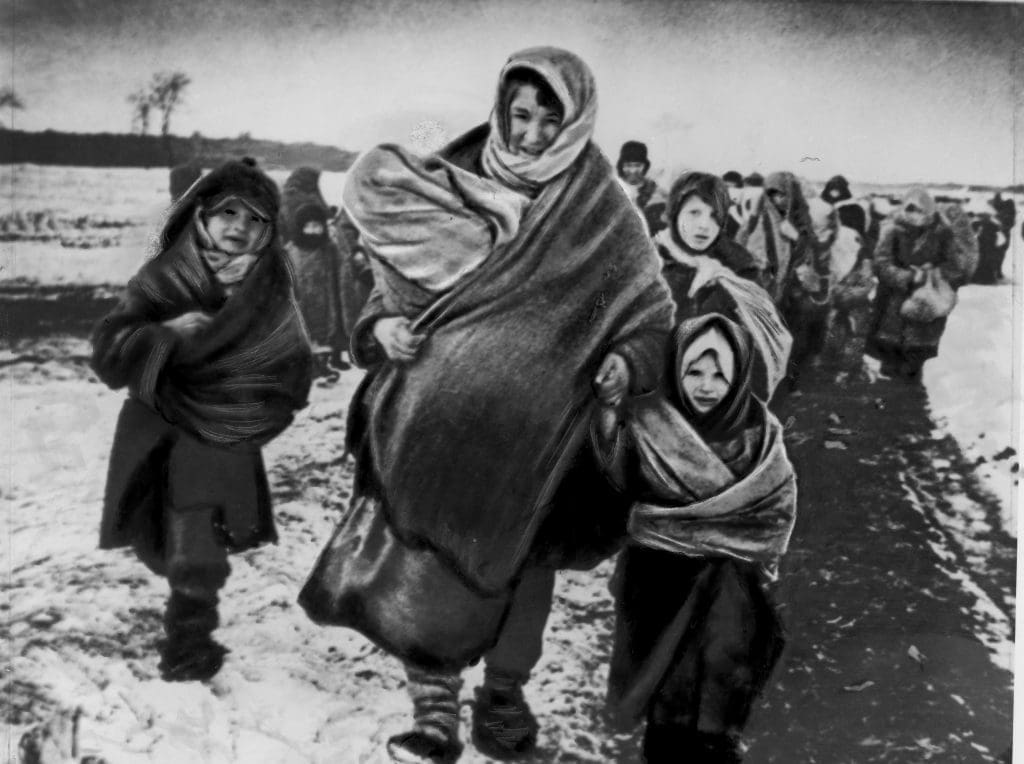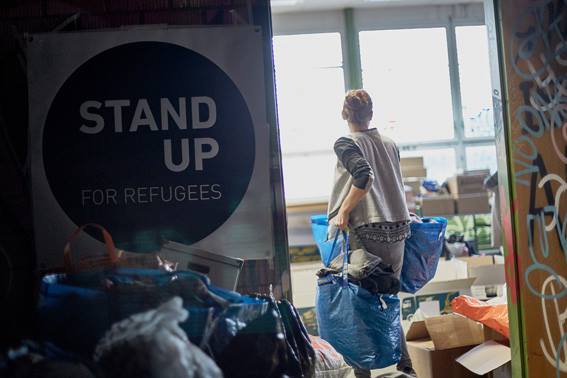AntiNote: This story was told in December 2014 to a live audience in Seattle at one of the RISK! Tour’s many live storytelling performances. RISK! describes itself as a platform for people to tell stories they “never thought they’d dare to share.” We hope many more will dare to share the kind of story that Kevin Bartlett tells here.
Transcribed from episode #614 of the RISK! podcast—Live in Seattle 2!—and printed with permission.
Borderline
by Kevin Bartlett
In 2003, in Jalisco, south of Guadalajara, a fight got started over a horse. It was actually a fight over the debt that was owed for a horse. Two Mexican cartel members made their way to the Guerrero family home, where a man named Pedro—father of three, husband—greeted them at the door. They told him that he owed them money. He tried to explain that he already paid for the horse, but the scene quickly got ugly. A nine-year-old, Raul, and his six-year-old sister Maria looked over their mother’s shoulder as the scene escalated from an argument to shouting to explosions.
A bullet left one of the cartel members’ guns, entered Pedro’s eye, exploded out the back of his head, and he crumpled. The explosion caused their mother to jump up and come cradle her dying husband. The cartel members shot her in the back of the head, and then fled the scene.
The explosions caused the two-year-old girl who was sleeping in the other room, who the killers didn’t even know was there, to start crying. Instinctively, six-year-old Maria ran to cradle her sister, while Raul watched as a pool of blood expanded and enveloped his parents and everything he knew up to that point in his life.
The neighboring community—fearing that the cartel members were going to come back and execute the only witnesses, the children—put them on a bus and sent them to Tijuana, where years ago someone who had grown up in the village had become a smuggler, and had been sending money back to the village, making him something of a hero at this point. Or at least a hope.
In 2003 in Bothell, Washington, I was mowing lawns at a local community college so I could pay for my environmental science classes and my cultural justice classes. Me and my friends were going around spray-painting “No More Blood for Oil” on McDonald’s windows, really sticking it to the man—or more likely we were sticking it to the hourly worker that had to scrub that shit off in the morning.
In the town of Bothell, there was a little family-owned Mexican restaurant that we had been going to since I was a kid, and it was owned and operated by the Guerrero family. (By the way, I’m changing names in this story—you’ll see why.) It was owned and operated by Roberto and Leticia Guerrero, and we had been good family friends of theirs forever. They used to come over to my parents’ house on American holidays, and we would go to their quinciñeras and all that stuff.
So when Roberto told me the story of what was happening to his little nephew and nieces, and asked if I would be willing to help him drive down to Tijuana and bring them back, I said, “absolutely.”
Roberto said, “I asked your father about this before, to make sure it was okay, and he said yes but that if anything happened to you, he’s going to kick my ass.” I really laughed thinking about this because if you know my father, the thought of him bringing violence against anyone is hysterical. But moreover it means that my father said, “Yes, take my son across the border, to a known drug smuggler’s house, try to bring back some illegal kids through armed border guards, facing at least a felony, maybe some time in jail—but if anything happens, I’ll give you a little tusslin’!”
So I said, “Yes, absolutely, under one condition: I’m calling my buddy Keith, and we’re bringing him.” Roberto reluctantly said okay, as long as Keith didn’t know what we were doing, that was fine.
So I called up Keith and told him what we were doing. (I couldn’t just be like, “Hey, we’re driving down to Tijuana 24 hours away and then heading back; it’s just a thing that people do.”) And he said absolutely.
So we set off, and 24 hours later we arrived in Tijuana. For me and Keith it was exciting. It was all these new smells, sounds; there’s culture everywhere, there’s madness, there’s people dressed in Incan garb dancing in the streets and all of this. It was something of a Kerouac adventure for us. Later that day Roberto explained to me that for him, and for most people born in Mexico, Tijuana represents something of a death to them. It’s a last-ditch effort to sell to the lowest bidder anything which can be sold. Your life, your body, certainly your culture—the culture which we thought we had experienced.
As we drove away from the city center and down the increasingly broken streets, it dawned on me that I was about to come face to face with these kids who in their short time on Earth had seen more brutality and hardship than any college paper that I could write would help me to understand.
As young punkrock kids from Washington, we did our best to rebel against what we thought were injustices (which certainly were). We marched in all the antiwar protests, we flyered and spraypainted, we caught teargas at the WTO, all of these things which felt very immediate and important and real (and they were). But suddenly here I was—fuck, here we were pulling into a smuggler’s house, and I thought, “this is real.”
A forty-year-old gentleman, smiling, waved us in (I assumed him to be the smuggler or dealer or whatever he was…I didn’t ask too many questions about that). Next to him was a nine-year-old boy who looked like he hadn’t slept in weeks, a six-year-old girl who looked terrified, and a two-year-old playing with a ball and laughing because she was too small to know any better.
We got out of the car. Me and Keith looked at each other and then we smiled at everyone. We didn’t speak any Spanish; they didn’t speak any English. And we all just kind of nervously smiled and nodded our heads, and we looked into each others’ eyes, and then we looked away.
The plan was simple. Roberto had a son, also named Roberto, who was nine years old. So we were going to take Raul, and Raul was now going to be Roberto Jr., and we had come down to get him from Roberto Sr.’s sister who had been taking care of him during the summer so that he could get in touch with his roots. And then her two little daughters, the two little girls: we were going to bring them back up to America so they could spend time with their uncle and see what that was all about. Seemed easy enough, I suppose.
Roberto coached Raul on what his new name was, what his birthday was, where they lived. He tried to get this kid to really fit the character. And on the side, me and Keith kind of coached each other.
Once again, I thought, fuck, this is pretty real. I said, “Remember, Keith, you don’t know anything about the situation that’s going on here.” He kind of smiled and turned his head to the side and said, “What’s going on here?”
“Thanks. Perfect.”
With that, we took off. When me and Keith were looking at the situation, understand that for us, if we got caught—which is something that we very much knew could happen; it was an adventure; it was a cause for us to grab onto—maybe we’d get caught. Maybe we’d make it through and be heroes. Maybe we’d get caught and spend some time and finally be able to prove and show that we were willing to put our money where our mouth is.
But right there next to us were three kids who didn’t have that option or the luxury of having that sort of a stance on their situation. For them it was life or death, and they had just seen death.
Eventually we got to the borderline. It was hot. It was an August day, it was a Saturday. It was slow-moving. For the first time I started to get really excited—and then really sick. And then excited, and then sick again. This just went back and forth. We tried to keep the mood light in the car, but Raul began to shake, and shake more visibly, staring straight ahead, the closer we got to the border. Roberto tried to lighten him up, tussling his hair, talking to him in Spanish, kind of poking his side. But it wasn’t really getting through. He couldn’t get him out of his head.
The next thing we knew, we were next. My stomach muscles and my chest were tightened so much, it was pushing my ribs into my lungs and it was making it hard to breathe. But all I could think of was what is happening to poor Raul up here. Everything he’s just seen—and now what we’re about to go and do. And then we’re there.
The squat, fat officer comes over, looking already annoyed, and in a slight drawl just says, “Roll down the windows.” So we roll down the windows and he sort of surveys the scene. He looks and he sees this forty-year-old Mexican man with a nine-year-old Mexican boy in the front seat, and in the back he sees two white guys and two little Mexican girls. And an odd expression came over his face as he tried to figure out what in the fuck was going on here.
He said, “Lemme see your papers.” So we gave him the papers, and he studied them hard. And he studied us. And then he looked at the papers again. And then his face actually relaxed and it looked like it was going to work out. He leaned in to hand them to us, and then kind of stopped, looked at us all one more time, and he said, “What’s everybody’s name?”
Well, kind of all on top of each other we said our names. Except for Raul, of course. So he kind of honed in on him. He stuck his head in the car a little farther. “What’s your name?”
Raul just shook and stared straight ahead. So in Spanish he said it one more time: “What’s your name?” And Raul, in a shaking voice, said, “…Roberto…Guerrero…?”
The officer drew his head back and said, “Was that a fucking question? What’s your name?”
“Roberto…Guerrero.”
At this point he turned to Roberto, and he said, “What in the fuck is going on here? How come this kid doesn’t speak any English? How come he doesn’t know his name?”
Roberto said, “Well, I, uh…well, I sent him down, ah, to stay with my sister…”
And he said, “No, no, no. The child papers you just gave me said he was born in the United States. You don’t forget English because you spent the summer with your aunt. Why don’t you go over there?” And he pointed us to the detention line.
As soon as we got there, they pulled the kids out. Raul turned back to look at us, as he was being dragged into the interrogation room, with just a remorseful, terrified face, and he was gone. And Roberto just kept repeating over and over, to us and certainly to himself: “It’s nothing. We’re fine, guys, it’s nothing.”
Thirty minutes later they brought us in, and as they did we saw the kids exiting the interrogation room with tear-stained faces. They didn’t ask us a lot of questions after that. They slapped bracelets on us and said, “Let’s go, smugglers.” And they put us in an elevator with two armed guards with shotguns. (I thought, who shoots a shotgun inside? Seems like that would be a problem.)
They took Roberto in one direction; they took me and Keith in the other. And a young, completely shaved-head officer sat me and Keith down in front of a framed picture of the Constitution and said, “I want you to look at this, and I want you to realize why you shouldn’t be allowed back in the United States.” Our blood boiled, and as we started to speak up and say something, three other officers ran over, screaming in our face, grabbed us, and pulled us to our hard plastic seats in a sea of hard plastic seats, and sat us down.
And as soon as he did, all eyes turned on us—the only two white kids. And the eyes were not exactly looking welcoming. After we were there for just a little while, staring at the ground—thinking one more time, “Fuck, this is real”—some people started talking to Roberto. And then laughter erupted—a noise that I was not expecting to hear. And as it did, the officers jumped up behind their desks, slammed their fists on it, and said, “Shut the fuck up!”
Well, suddenly we looked up and all those hard eyes that were glaring at us were now smiling. And the man next to me said, “We asked your friend what he’s doing here with these gringos, and he said he got caught trying to smuggle you into Mexico!
“No, but he told us what happened,” he said. “Good lookin’ out.”
And suddenly everyone wanted to tell us their story. So I heard stories of people that were in desperate situations, trying to find a better life for themselves, or trying to bring their brother across. People who didn’t really have an option. I mean, here we were—we certainly had an option. We were doing this for adventure and a sense of justice. Everyone else in there was doing it because they had to. It seemed like that was the only way that they were going to make a better life for themselves, or any sort of life.
Now, they don’t let you sleep. It’s impossible to do. You sit in these hard plastic chairs and you kind of nod off, and it doesn’t work out. If you lean forward, they come wake you up. And Keith—I love him, but he really likes to push it in the wrong situations. He turned to me after about eleven straight hours of sitting there, with blood-shot, half-open eyes, and he said, “Fuck this, I have to sleep.” So he got on his hands and knees, and he crawled to the wall opposite the desks, and laid out like he was in a fucking Holiday Inn.
Everyone around me is grabbing me and shaking me and pointing at him and saying, “Uh-uh! No.” Half delirious, I think it’s funny. There’s nothing I can do about this shit. So we’re sitting there for a while, and about twenty minutes later a woman who looks like a bulldog standing straight up and wearing leather boots walks over to him, stands over him staring at him, and with a toe-punt to the ribs, rips him and me out of the idea that we have any sort of free will or control over what is happening to us right now.
As Keith’s eyes meet her steely gaze, she growls out through gritted teeth, “Mornin’, sunshine.” She grabs a hold of his shoulder, and has him on his feet and disappeared in the back room in seconds.
I started panicking. I had no idea what’s happening. Keith’s gone. I can only imagine what sort of beating he’s receiving back there. Everyone that’s telling me stories about all of these people, the officers and all of this—they’re not nice people. Stories of violence was all I was hearing from these guys. And now they have Keith—who absolutely fucked up. They have a reason to kick his ass, in their warped minds. I can’t close my eyes because every time I do, all I see is just some atrocious act being taken out on him.
About 45 minutes later he comes back, looking at the ground. They’ve stripped him of everything except for his pants and his shirt. And as he trudges back over to his seat right in front of me, they sit him down and everyone is silent, staring forward. The gravity of the situation is on us.
And I don’t know what is wrong with me, but when I’m in these sorts of situations, I have to find a way out by any means. So I lean forward and in a soft whisper I say to him, “Mornin’, sunshine.” The crowd erupts in laughter. We all feel human again. It’s okay. Keith’s back, and from what I can tell he’s okay.
A few hours later, they kick us out on one side of the border; they kick the kids out on the other. Me and Keith receive warnings. Months after this happened, a law would pass that would no longer allow that to happen; we would have gotten felonies. Roberto gets a felony and they keep his car.
We fly back to Washington, and a week later those same border guards that sat us in front of the Constitution, all high and mighty: for a bribe, they let those kids over. One week later.
Also, a week after that, against all odds we find out that Pedro, their father, had actually lived through the shooting. He had lost his eye and hearing in his right ear, but he actually made it through.
And the last time we saw them was in that Mexican restaurant. We walked in, and we all nervously smiled, and nodded, and looked into each others’ eyes, and this time we didn’t look away.

